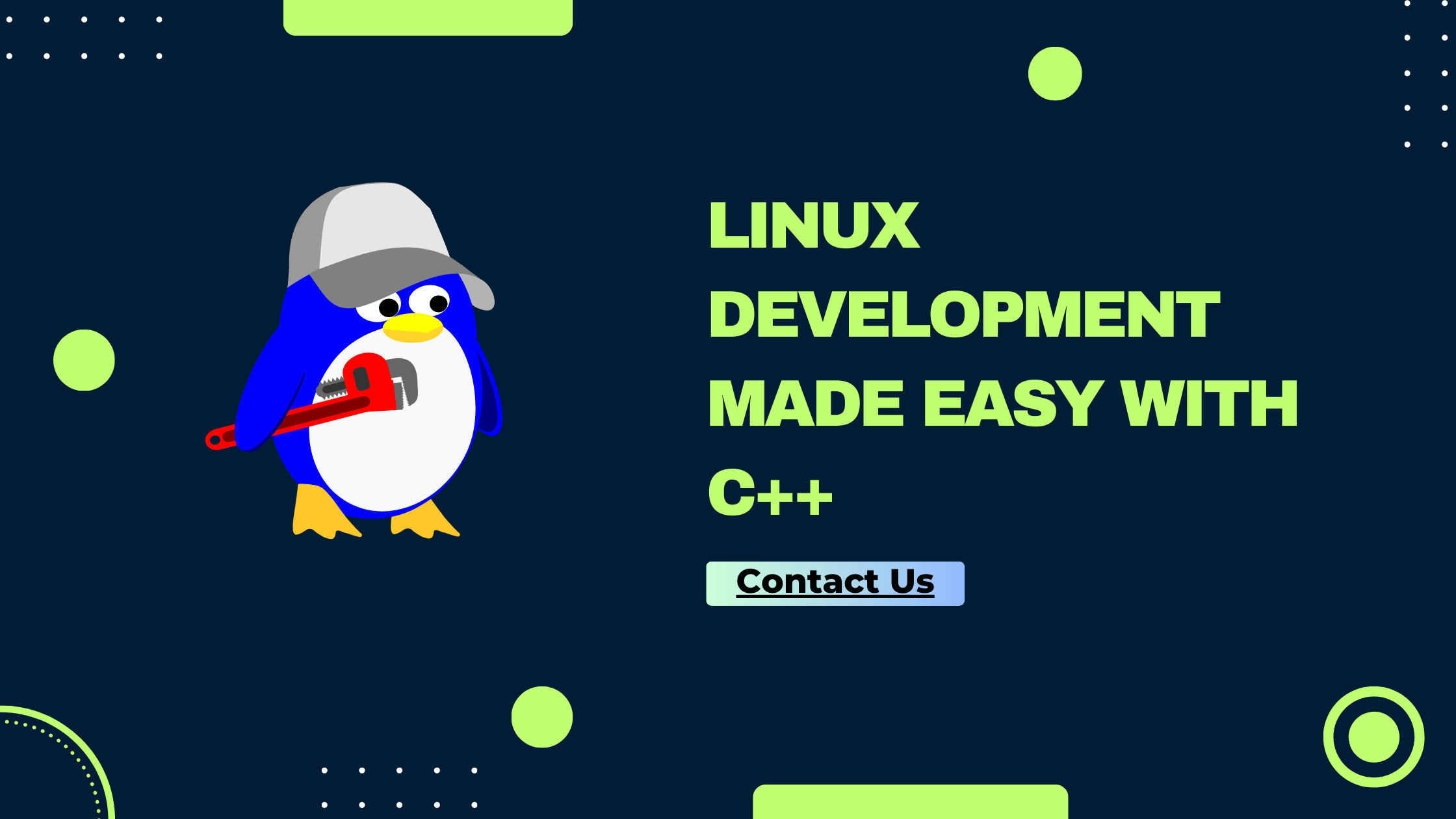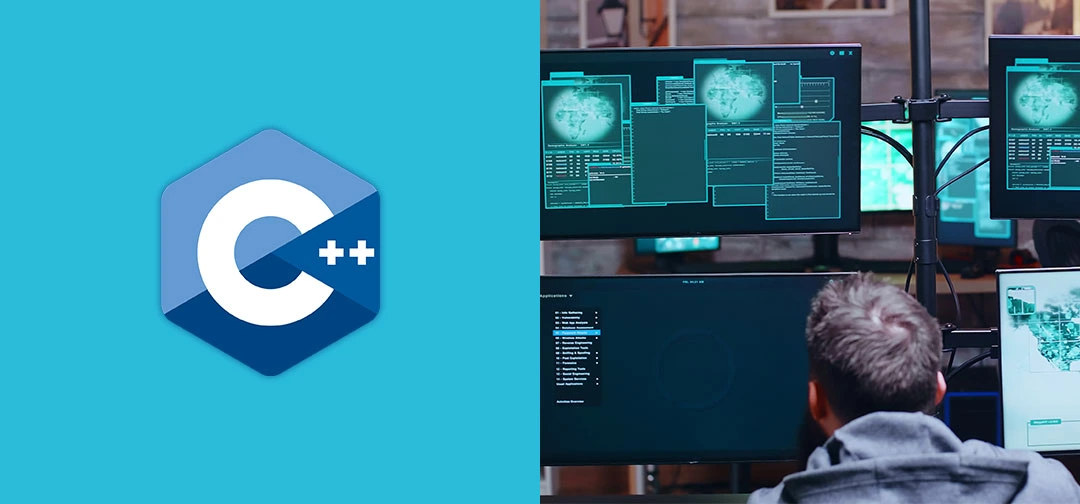
Posted on Thursday, May 25th, 2023
Optimizing C++ Development for Linux
C++ development on Linux platform brings together two powerful entities, combining the versatility and performance of the C++ language with the robustness and flexibility of the Linux operating system. Linux, renowned for its open-source nature and vast developer community, provides a fertile ground for CPP programmers to create efficient and high-performance applications. With a plethora of development tools, libraries, and utilities, Linux offers a compelling environment for C++ developers to unleash their creativity and maximize their coding potential.
Key Tools and Techniques used in C++ Development on Linux
When it comes to developing C++ on Linux, there are several tools and techniques that developers commonly use to enhance their productivity and streamline the development process. Here are some of them:Integrated Development Environments (IDEs)
IDEs provide a comprehensive development environment with features such as code editing, debugging, and project management. Popular IDEs for C++ development on Linux include:• Eclipse CDT
• CLion
• Code::Blocks
• Qt Creator
Command-Line Tools and Compilers
Linux offers a wide range of command-line tools and compilers specifically designed for C++ development. These tools provide efficient compilation, debugging, and profiling capabilities. Some commonly used tools are:• GNU Compiler Collection (GCC): Includes the popular compiler g++ for compiling C++ code.
• LLVM Clang: A versatile compiler with excellent diagnostics and static analysis capabilities.
• GDB: The GNU Debugger for debugging C++ applications at the source code level.
• Valgrind: A powerful tool for memory debugging, leak detection, and profiling.
Build Systems
Build systems automate the compilation, linking, and deployment process of C++ projects. They manage dependencies, ensure efficient builds, and support incremental compilation. Some commonly used build systems for C++ development on Linux are:• CMake: A widely adopted; cross-platform build system generator.
• GNU Make: A popular build tool that uses Makefiles for defining build rules.
• Bazel: A build tool from Google that focuses on scalability and reproducibility.
Version Control Systems (VCS)
Version control systems are essential for managing source code and collaborating with other developers. Git is the most popular VCS and is widely used in C++ development on Linux. Platforms like GitHub, GitLab, and Bitbucket provide hosting and collaboration features for Git repositories.Memory Management and Debugging
C++ developers on Linux often employ memory management techniques and debugging tools to identify and resolve memory-related issues. Some commonly used tools include:• AddressSanitizer (ASan): A runtime tool for detecting memory errors like buffer overflows and use-after-free bugs.
• LeakSanitizer (LSan): A tool for detecting memory leaks in C++ applications.
• GDB with memory debugging extensions: Allows debugging and analyzing memory-related issues at runtime.
Profiling and Performance Optimization
Profiling tools help identify performance bottlenecks in C++ applications, allowing developers to optimize critical sections of code. Some widely used profiling tools on Linux include:• Perf: A performance analysis tool that provides insights into CPU usage, cache behavior, and more.
• Valgrind (Callgrind): Profiling tool that collects runtime information for performance analysis.
Parallel Programming
Linux provides robust support for parallel programming, allowing developers to take advantage of multi-core processors. C++ libraries like OpenMP and pthreads provide threading capabilities, and platforms such as MPI (Message Passing Interface) enable distributed computing.Best Practices To be Followed While Developing C++ on Linux
Following are some of the best practices that can greatly enhance the quality, efficiency, and maintainability of your C++ Programming in Linux:Use a Modern C++ Standard
Utilize the features and improvements introduced in the latest C++ standards (e.g., C++11, C++14, C++17, C++20). These standards offer enhanced language capabilities, improved syntax, and powerful libraries that can simplify and optimize your code.Follow Linux Coding Standards
Adhere to the coding standards followed by the Linux kernel and other major open-source projects. These standards, such as the GNU Coding Standards, provide guidelines for formatting, naming conventions, commenting, and code organization, ensuring consistency and readability.Utilize Version Control
Use a version control system like Git to track changes to your codebase. Regularly commit your code and leverage branching and merging strategies to facilitate collaboration, code review, and easy rollbacks.Modularize Your Code
Break your code into small, cohesive modules or classes, adhering to the principles of modularity and encapsulation. This makes the code more maintainable, testable, and reusable. Use namespaces to avoid naming conflicts.Document Your Code
Provide clear and concise documentation for your code, including comments, function and class headers, and high-level explanations. Use tools like Doxygen to generate API documentation automatically.Perform Through Testing
Write unit tests and integration tests to validate the functionality and correctness of your code. Use testing frameworks like Google Test or Catch2 to automate the testing process. Continuous Integration (CI) tools can further automate the testing process and ensure code quality.Optimize for Performance
Pay attention to performance considerations while writing code. Employ appropriate algorithms, data structures, and optimization techniques. Use profiling tools like Perf or Valgrind to identify performance bottlenecks and optimize critical sections.Handle Errors and Exceptions
Implement proper error handling and exception handling mechanisms to gracefully handle runtime errors and exceptions. Use exceptions sparingly and judiciously, keeping in mind the performance impact and potential pitfalls.Maintain Portability
Write code that is portable across different Linux distributions and platforms. Avoid using platform-specific features and APIs unless necessary. Use cross-platform libraries and abstraction layers to ensure compatibility.Stay Updated with Security Practices
Keep abreast of security practices and vulnerabilities relevant to C++ development on Linux. Follow secure coding guidelines, sanitize input, avoid buffer overflows, and use safe coding practices to mitigate potential security risks.Leverage Linux Tools and Ecosystem
Familiarize yourself with Linux-specific development tools, libraries, and utilities. Make use of powerful debugging tools like GDB, profiling tools like Perf, and build systems like CMake. Explore open-source libraries and leverage the vast Linux ecosystem for efficient development.Top Linux Distributors
When it comes to C++ development on Linux, selecting the right distribution can significantly impact your productivity and coding experience. Linux offers a wide range of distributions, each tailored to different needs and preferences. Here are some of the top Linux distributions renowned for their suitability in C++ development:Ubuntu
Regarded as one of the most widely adopted Linux distributions, Ubuntu stands out for its user-friendly interface and extensive community support. It provides a robust ecosystem for C++ development, offering straightforward installation of development tools and libraries. Ubuntu's long-term support (LTS) versions ensure stability and compatibility for long-term projects.Fedora
For developers seeking cutting-edge software and the latest C++ features, Fedora excels as a bleeding-edge distribution. It boasts a progressive approach to updates and packages, making it a suitable choice for those who prioritize staying at the forefront of technology. Fedora's emphasis on innovation and community involvement creates an ideal environment for C++ experimentation and development.CentOS
Derived from the reputable Red Hat Enterprise Linux (RHEL), CentOS is renowned for its stability, reliability, and long-term support. It serves as a solid foundation for C++ development, ensuring compatibility and security for enterprise-level projects. CentOS's conservative update cycle, coupled with its strong focus on stability, makes it a popular choice among developers seeking dependable infrastructure for their C++ applications.Arch Linux
For experienced developers who value customization and control, Arch Linux offers a minimalist and user-centric approach. Its rolling release model ensures continuous updates and access to the latest C++ development tools and libraries. Arch Linux's flexible nature enables tailored setups, allowing developers to fine-tune their development environment according to their specific requirements.Manjaro
This is a rolling-release distribution that is based on Arch Linux. It is known for its bleeding-edge packages and its active community. Manjaro is a good choice for developers who want to stay up-to-date with the latest C++ features.openSUSE
Combining stability and usability, openSUSE caters to developers seeking a well-rounded Linux distribution. It provides a user-friendly experience with comprehensive package management tools and a wide range of available software. With its emphasis on community collaboration, openSUSE offers ample resources and support for C++ developers.Blue Summit's C++ Services: Comprehensive Solutions Tailored to Your Needs
Blue Summit offers a wide range of C++ software development services, designed to address your specific requirements with precision. Whether you seek development, upgrading, modernization, or support for C or C++ based applications and product solutions, our experienced team is ready to assist you. With over 20 years of expertise, we excel in delivering efficient solutions across diverse environments and development platforms.Custom Software and Application Development
We specialize in developing customized software and applications, tailored to your unique business needs. Our team collaborates closely with you to understand your requirements and create reliable, high-quality C++ solutions that drive your success.Maintenance and Support of New or Legacy Applications
We provide comprehensive maintenance and support services for both new and existing applications developed in C, C#, or C++. Our dedicated team ensures the smooth operation of your software, resolves issues promptly, and implements necessary updates and enhancements.Development and Optimization of High-Performing Software
Our expertise extends to developing and optimizing high-performing software or product solutions. By leveraging the power of C++ and employing efficient coding practices, we deliver software that excels in speed, reliability, and scalability.Cross-Platform Application Development
We excel in creating cross-platform applications, enabling you to reach a broader user base across multiple operating systems. Our team ensures seamless functionality and a consistent user experience across diverse platforms, including Windows, Linux, macOS, and more.C or C++ Server-Side Software Development
Blue Summit specializes in server-side software development using C or C++. We develop robust and scalable server-side solutions that meet your specific requirements, ensuring optimal performance, security, and reliability.Hardware-Specific Software Solutions
If your project requires hardware-specific software solutions, our team is well-equipped to tackle the challenge. We have experience developing software that interfaces with hardware components, enabling seamless integration and functionality.Extensions, 3rd-Party Integrations, and Plugins
We assist you in extending the functionality of your software by developing custom extensions, integrating third-party solutions, and creating plugins. These enhancements expand the capabilities of your applications, empowering you to meet evolving user demands.At Blue Summit, we are committed to delivering top-notch C++ services that cater to your unique needs. Contact us today to explore how our experienced team can assist you in achieving your software development goals.
Conclusion
C++ development on Linux offers a powerful platform and an exciting journey where developers can leverage the power of the C++ language, the flexibility of the Linux platform and the extensive tools and resources available. Linux, with its open-source nature and vast community, provides a fertile ground for CPP programmers to unleash their creativity and maximize their coding potential.At Blue Summit, we take pride in offering a dedicated team of skilled C++ developers to meet the diverse needs of our esteemed clients. Whether your project requires expertise in Windows or Linux environments, we have you covered. Our comprehensive range of C++ services is tailored to deliver exceptional solutions for your business requirements. Get in touch with us today to explore the full spectrum of services we provide and discover how we can assist you in achieving your goals in the realm of C++ development.
Blue Summit has collaborated with OdiTek Solutions, a frontline custom software development company. It is trusted for its high service quality and delivery consistency. Visit our partner's page today and get your business streamlined.
REFER TO OTHER RELEVANT CONTENTS

C++ Development Services
Get a dedicated C++ development team in 7 Days! Get Started C++ is a widely adopted object-oriented programming language that is leveraged to develop high-performance, large-scale enterprise applications that can run seamlessly across multiple platforms and devices. Its popularity stems from the ability to construct...
read more








